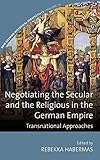Negotiating the Secular and the Religious in the German Empire : Transnational Approaches / ed. by Rebekka Habermas.
Material type: TextSeries: New German Historical Perspectives ; 10Publisher: New York ; Oxford : Berghahn Books, [2019]Copyright date: ©2019Description: 1 online resource (244 p.)Content type:
TextSeries: New German Historical Perspectives ; 10Publisher: New York ; Oxford : Berghahn Books, [2019]Copyright date: ©2019Description: 1 online resource (244 p.)Content type: - 9781789201512
- 9781789201529
- 200.943 23
- online - DeGruyter
| Item type | Current library | Call number | URL | Status | Notes | Barcode | |
|---|---|---|---|---|---|---|---|
 eBook
eBook
|
Biblioteca "Angelicum" Pont. Univ. S.Tommaso d'Aquino Nuvola online | online - DeGruyter (Browse shelf(Opens below)) | Online access | Not for loan (Accesso limitato) | Accesso per gli utenti autorizzati / Access for authorized users | (dgr)9781789201529 |
Frontmatter -- Contents -- Introduction. Negotiating the Religious and the Secular in Modern German History -- Part I. Religious and Secular: Scientific Debates -- 1. A Secular Age? The ‘Modern World’ and the Beginnings of the Sociology of Religion -- 2. The Silence on the Land: Ancient Israel versus Modern Palestine in Scientific Theology -- Part II. Religious and Secular Public Debates -- 3. What Does It Mean To Be ‘Secular’ in the German Kaiserreich? An Intervention -- 4. Secularism in the Long Nineteenth Century between the Global and the Local -- Part III. Religious and Secular Negotiating Boundaries -- 5. Retrieving Tradition? The Secular–Religious Ambiguity in Nineteenth-Century German-Jewish Anarchism -- 6. Catholic Women as Global Actors of the Religious and the Secular -- 7. Negotiating the Fundamentals? German Missions and the Experience of the Contact Zone, 1850–1918 -- Index
restricted access online access with authorization star
http://purl.org/coar/access_right/c_16ec
With its rapid industrialization, modernization, and gradual democratization, Imperial Germany has typically been understood in secular terms. However, religion and religious actors actually played crucial roles in the history of the Kaiserreich, a fact that becomes particularly evident when viewed through a transnational lens. In this volume, leading scholars of sociology, religious studies, and history study the interplay of secular and religious worldviews beyond the simple interrelation of practices and ideas. By exploring secular perspectives, belief systems, and rituals in a transnational context, they provide new ways of understanding how the borders between Imperial Germany’s secular and religious spheres were continually made and remade.
Mode of access: Internet via World Wide Web.
In English.
Description based on online resource; title from PDF title page (publisher's Web site, viewed 25. Jun 2024)


